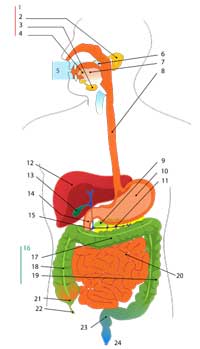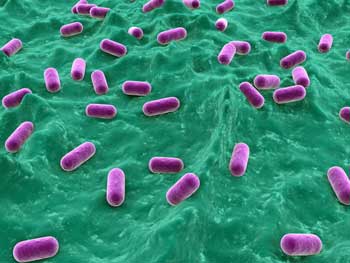

The role the gut plays in our health is being increasingly recognized and ME/CFS researchers are not going to be left out. At least four gut studies are underway or are about to get underway and we’ve had three gut studies published in the last couple of months. This is the first to two studies from this Australian group.
Support for the Microgenderome: Associations in a Human ClinicalPopulation. Amy Wallis, Henry Butt, Michelle Ball, Donald P. Lewis & Dorothy Bruck. Scientific Reports | 6:19171 | DOI: 10.1038/srep19171
There were no healthy controls but this study examining the effects of gender on the symptoms and gut bacteria in ME/CFS was huge (n=274). The study wanted to know if the microbiome in ME/CFS was different in men and women, if some bacteria were associated with different symptoms, and if

Why look at gender? Gender is becoming increasingly recognized as an important factor in studies. Male mice, for instance, with their simpler immune and hormonal systems have dominated research studies for decades but males can’t begin to match females more complex systems. Their prime directive – to provide sperm – pales beside the complexity needed to grow and carry a child to term.
A striking findings in laboratory animals, for instance, suggests that T-cells – not the microglia – may play a key role in producing chronic pain in women.
Results
The symptoms found in the two groups were similar. Except for a tendency for increased pain and fatigue and neurocognitive scores, women and men tended to have similar symptoms. Nor did their gut composition differ significantly.
Men and women reacted very differently, however, to three of the main gut genera (Clostridium, Streptococcus, Lactobacillus) tested.
Clostridium, Lactobacillus, Streptococcus….
The study suggested that bacteria of the Clostridium genera could be whacking women in a number of ways. Significant small to medium correlations between the abundance of Clostridium bacteria and fatigue, neurocognitive symptoms, sleep, immune impairment and total symptoms suggested that women with ME/CFS might want to steer their gut flora in a different direction.
If Clostridium bacteria appeared to be a kind of kryptonite for women they were more like manna for men. So far as they were concerned, the more Clostridium bacteria the better; men with increased Clostridium bacterial levels had improved mood and a tendency for pain, gastrointestinal and energy production issues.
The situation was reversed with Lactobacillus bacteria. Males with more Lactobacillus bacteria had more severe symptoms overall and more neurocognitive, neurosensory, pain and mood symptoms but women appeared to be affected by Lactobacillus bacteria not at all.
Streptococcus bacteria continued the trend. Men with higher levels of Streptococcus bacteria tended to have more pain, worse sleep, more gastrointestinal symptoms, more problems with energy and more severe symptoms overall. Women, though, with higher levels of Streptococcus bacteria experienced less pain, neurosensitive problems and immunity impairments.
The Sex Divide
The differing effects of the gut flora on symptoms in men and women was intriguing given studies showing very high rates of gynecological disorders in women with ME/CFS. Those studies and others suggest that estrogen, an immune regulator among other things, could play a role in producing ME/CFS. Broderick’s immune studies suggest that testosterone, on the other hand, may play a protective role for me. The authors noted that the gut flora can effect estrogen production.

Lactobacillus and Streptococcus spp. , on the other hand, could possibly be contributing to neurological symptoms in men. These two genera contain bacterial species that produce an agent called d-lactic acid which in higher levels can be neurotoxic. L-lactic acid is easy to metabolize but humans have more difficulty metabolizing d-lactic acid.
A 2009 De Meirleir study found increased rates of D-lactic acid producing streptococcus and enterococcus spp. in people with ME/CFS. De Meirleir reported that d-lactic acidosis is caused by the bacterial fermentation of carbohydrates in the gut which also increase gut permeabililty by lowering pH levels in the intestine. The increased gut permeability then results in increased D. lactic acid levels in the blood.
De Meirleir’s study suggested that E. coli had been largely replaced by lactic acid producing bacteria (Enterococcus and Streptococcus spp.) in ME/CFS. Why this had happened was unclear but De Meirleir suggested an enterovirus infection could be to blame.
He proposed using short courses of an appropriate antibiotic, alkalinizing agents, a low carbohydrate diet and reduced sugar intake could help.
The authors of the present paper suggested that their findings suggest that men with ME/CFS might want to be careful about using probiotics containing lactobaccillus spp. that could increase D. Lactate producing bacteria. High sugar diets alone can increase d-lactic acid levels but L. acidophilus – a commonly found bacterial species in yogurt and probiotics – mainly produces D-lactic acid.
Just as in the muscles, d-lactate or d-lactic acid causes a shift from aerobic from anaerobic metabolism. People with good digestion probably have no problem clearing the d-lactate produced by these bacteria but people with leaky gut – who may be, ironically, inclined to take these probiotics – may not. Lactic acid producing bacteria, on the other hand, can clearly be beneficial for many.
What to do? One blogger suggests the problem may not be the presence of L. acidophilus so much as the overwhelming abundance of it in some probiotic mixtures. Taking a probiotic that contains a variety of species may help or you might want to try d-lactate free probiotics.
Caveats
We caution against over-interpretation of these findings considering the limitations of cross-sectional, observational research design (unable to establish causation or consequence, difficulty excluding confounding variables) and categorical analysis of genera rather than species. The authors
This study did point out some possible factors that made sense given what we know about ME/CFS. Because it was unable to identify species, however, it was less a call for a specific treatment approach than a call for more research.
D-lactate producing bacterial species, for instance, could be causing harm in ME/CFS but there’s no way to tell that they are without identifying the species involved in producing symptoms in ME/CFS. Ditto with the Clostridium spp. (C. difficile, C. perfringens) species mentioned. The authors posted hypotheses that need to be tested in more refined studies.
Multiple types of lactobacillus, streptococcus and clostridium bacteria are found in the guts of humans. Because the researchers were unable to determine the species present it’s not which probiotics might be helpful.
Their findings suggesting that men and women with ME/CFS respond very differently to gut bacteria indicated that future gut studies should take gender into account.
The significant gut findings are starting to pile up. This study’s possible Clostridium findings in women could jive with that from Shukla’s Solve ME/CFS Initiative gut/exercise study. That study suggested that Clostridium bacteria may be contributing to leaky gut and then translocating to the blood during exercise. Maes’s 2012 study suggested translocated gut bacteria may be sparking inflammation in ME/CFS. The Lipkin/Hornig study underway has some strong preliminary findings.
Some broad outlines have been drawn. Something appears to be going on. Given the incredible bacterial diversity found in our guts, the different types of ME/CFS that surely exist, and the inability, of many studies to identify individual species, we have quite a ways to go before getting a real handle on the microflora found in ME/CFS patients guts, however.
- Interested in alternative approaches to healing the gut? Register for and watch the free Microbiome Summit in late February. Learn more about the Summit here.








This is fascinating. I’ve been experimenting with probiotics in high dosages since Carol Wolf’s post and starting to follow Ken Lasessen’s blog. Since I’m a male, anyone know how would I lower Streptococcus and Lactobacillus and raise my Clostridium levels?
May i ask which probiotic you have been using?
A rotation of Culturelle, Align and Prescript Assist. As directed on the package, usually one a day. I switch every week or so. Cannot tell any noticeable difference, but I’ve been going through a hellish flare of brain fog and fibro.
I too have been trying the high dose of probiotics since the Wolf article. No marked improvement. Actually had to cut back on the dosage after 3 weeks because symptoms seemed a bit worse. I’m using: Complete Probiotics by Mercola, Multidophilus 24 by Solaray, Ultra-50, and a basic Walgreens brand probiotic.
I don’t know but since we don’t know what Strep and Clostridium species were involved it might be best to just try probiotics containing a wide variety of species in hopes that they will rebalance your system.
Interesting…..I know that I got a ton worse (& also added gastroparesis and other GI issues to the ME/CFS) when I tried taking probiotics for a couple of months….and that not only never improved after stopping them, but it started a major downward spiral. I know that probiotics have helped a lot of people, but for me, they were the single worst thing I tried since getting sick (& I have been sick for 11 1/2 yrs, so I have tried a ton things over that time frame)
I am having the same experience. At the end of week four I actually feel as though a crash is coming on or is here. Cutting back for a week or so to see what happens but I am not confident.
As an Aussie, I feel the excellent work of our researchers often gets overlooked in the international ME/CFS patient community.
Thanks for covering this important Australian study, which indicates that fundamental gut/immune system differences may be at work in men and women/boys and girls with ME/CFS.
🙂 Your researchers are doing a lot of great work. Another blog on this groups work is coming up 🙂
Thanks Cort – looking forward to it ?
Fiona: we love to see great work done in Australia & I tell people great work down down under and in EU, and need more work also in USA still since $5M/year R&D by NIH historically for M.E., vs $3B per year for HIV for example, is gross discrimination.
Note that more funding is needed worldwide, including philanthropic funding by individual donors, foundations etc.
One worldwide resource we can help to help M.E. is Rotaries International. They have spent close to $1B over decades to nearly eradicate Polio worldwide, where there on now perhaps 100 cases total.
Some people in 1930’s for example called ME/CFS like diseases “Atypical Polio” so hope we can educate and enlist Rotaries worldwide, including Down Under, to do the next step to eradicate ME/CFS worldwide for 20,000,000 that suffer from this disease. They have good relations with large foundations like Gates etc., so could perhaps coordinate and get matching funds and greatly expand R&D worldwide, incl Australia, People dedicated to this like Dan Peterson who work in California/Nevada and Australia and many others with great ideas in US, Norway, Sweden, Japan, Belgium, Turkey (Hyperbaric oxygen treatment studies). I have given two talks to local Rotaries and if people can start with closest Rotaries, then regional, countrywide and worldwide, I think this is one other very promising avenue to Cure M.E. worldwide. I am not a Rotary member, but they welcome outside speakers incl those aligned with their missions which includes curing disease. https://www.rotary.org/
If you know anyone with Interest in Korea, hope they might attend International convention this Spring and promote this as a new mission for Rotaries international. http://www.riconvention.org/
Rotaries currently collect about $100Million dollars US year for Polio and have outside organizations that may match this so if we approach Rotaries International (and other great organizations), might perhaps get $100M R&D from NGO’s, non government, to complement the smaller Govt R&D expenditures. This would be Curing M.E. into high gear, and out of the historical doldrums that started to change this year.
I’m in Europe and very interested in the gut studies.
A translational biomedical research strategy is underway at Norwich Research Park in UK, investigating the role of the gut microbiome – http://www.investinme.org/LDR%20UK%20Gut%20Microbiota.htm
The researchers formed a European ME Research Group (EMERG) last autumn, an initiative of the European ME Alliance (EMEA).
They will be involved with the international Biomedical Researchers into ME Colloquium (BRMEC) in London in June – http://www.investinme.eu/IIMEC11-news-0202.shtml
Thanks – thankfully, there’s a lot of interest in this area.
My CFS Doctor just diagnosed me with H Pylori. She is recommending a 3 week regimen of 3 types of medication. I’m fearful of taking anything because of my extreme sensitivity to medication. Has there been any research between H Pylori and CFS? Has anyone had any experience with having HPylori? I know this is all gut related.
I too began yet another attempt at Probiotics after reading Carole’s story. I did a ton of research,which I had never done before my previous (failed) attempts. Two stood out in most forums and reviews: Prescript Assist soil based caps, and Orthomolecular probiotic powder. i took them both an noticed a difference after about two weeks. Nothing like the author’s radical change, just a feeling of being stronger, a little more energy. Encouraged, I then added NOW – I forget the name – the one that M. Wolfe mentioned in her article, and Innovix large spectrum.
Apparently this was too much for my body. i felt nauseated, i swung between consitpation and diarrhea, an my stomach felt ‘hollowed out’ and yet bloated – don;t know if anyone else has felt that!
So – I came off everything and felt very down. Doctors don’t have a clue – just wanted to puttee back on antidepressants etc. Then my husband reminded meow the first few weeks before i’d gone pro-biotic mad. I’d forgotten. i amazoned the Prescrispt-Assist immediately and i feel much ,much better. Still wake up in searing pain everywhere (it’s my feet at the momenta) still have urges to lie in bed all day,
Sorry – I was on the last line of my comment and i managed to press the send button inadvertently!
it should have read ‘still have urges to stay in bed all day, but I don’t – and seriously – athough it still hurts, I now don’t have to pay the price for it with a week i bed like a use to.
(Apologies also for ‘puttee’ and ‘meow’ which you can find randomly in my comment. I think we should al come together and defeat autocorrect once and for all……)
My family has a long history with gut issues – we’ve tried everything over several years… Haven’t had much help from typical drugstore probiotics – Culturelle made me violently ill, though studies on l. Rhamnosus say it works.
Most of the drugstore ones are milk-based, which can be counterproductive for many. To save money, I’ve been trying Garden of Life’s “Dr. Formulated” 50 billion women’s this month and can’t say it does much.
What HAVE been helpful are Xymogen’s ProbioMax in the 30 & 100 billion versions, and the Pharmax Human strain probiotics. I have also seen wonderful things about VSL #3 but haven’t tried it.
That said, there are MANY things that can live in the gut. Japan’s Riken Institute has done a great job looking at the diversity. There have also been studies on various indigenous populations, which have shown extraordinary diversity – what the scientists hypothesized would be there wasn’t and vice versa.
I think it’s a multi headed problem with a multi pronged solution:
1) don’t eat sugar (or even lots of fruit).
2) eat a good amount of a wide variety of vegetables (within a Ketogenic or Paleo diet context)
3) eat a variety of fermented foods (start with small amounts)
4) take a high quality probiotic
And, if your gut isn’t working well – pay attention to nutrients that need to be converted in your gut – sublingual, injectible, or topical versions might be needed.
A DNA-based stool test from time to time is also a valuable tool for mid-course correction. These things take time, so have a good plan for the long haul – don’t believe those who say you can change your gut in less than a week – for most of us, it ain’t that easy.
Well said Learner!